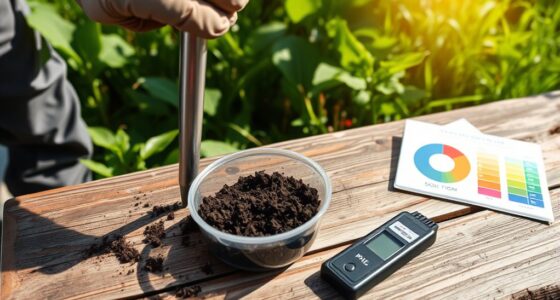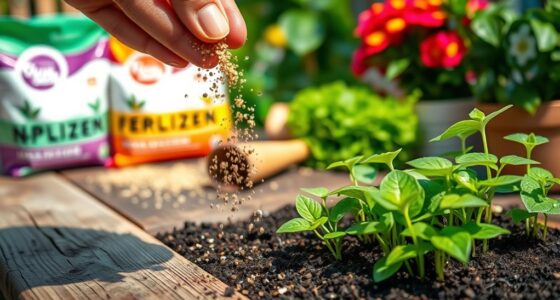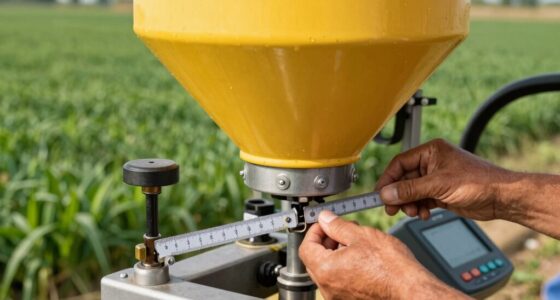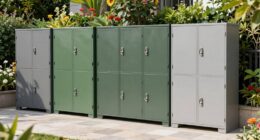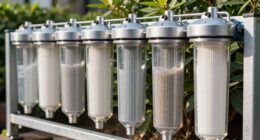Understanding N-P-K ratios helps you select the right fertilizer for your plants’ needs. N stands for nitrogen, which promotes lush foliage; P is phosphorus, supporting root and flower development; and K is potassium, boosting overall health and disease resistance. Matching these nutrients to your plants’ growth stage ensures healthy, vibrant results. Keep exploring how different ratios affect your garden, and you’ll soon master how to optimize plant growth and health effectively.
Key Takeaways
- N-P-K values indicate the ratio of nitrogen, phosphorus, and potassium in a fertilizer, key nutrients for plant growth.
- Nitrogen promotes lush foliage; phosphorus supports root development and flowering; potassium enhances overall plant health.
- Choose fertilizers based on your plants’ specific needs and soil conditions, often determined through soil testing.
- Understanding N-P-K helps prevent over- or under-fertilizing, ensuring balanced nutrient supply.
- Organic fertilizers provide gradual nutrient release, supporting sustainable growth and soil health alongside N-P-K knowledge.
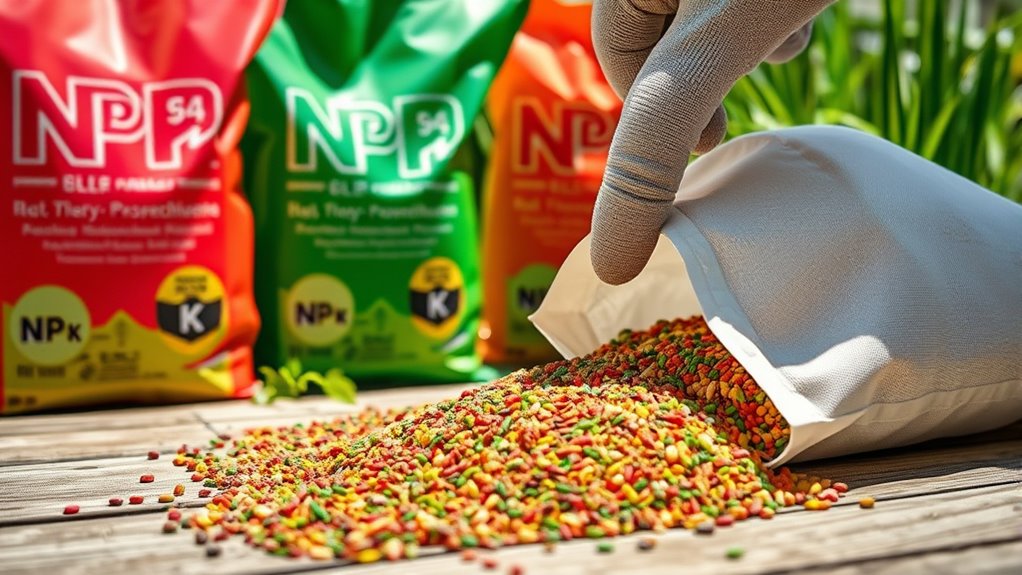
Have you ever wondered how healthy, lush plants grow? The secret often lies beneath the surface, in the soil that sustains them. Your plants depend on the right balance of nutrients to thrive, and that’s where soil amendments and organic fertilizers come into play. Soil amendments are materials added to improve soil structure, enhance fertility, and promote healthy root development. Organic fertilizers, on the other hand, are natural sources of nutrients that release gradually, supporting plant growth without harming the environment. When you understand how these components work together, you gain the power to nourish your plants effectively.
Healthy plants thrive through balanced soil amendments and organic fertilizers.
Soil amendments like compost, peat moss, or aged manure enrich the soil with organic matter, improving its texture and water retention. They create a hospitable environment for beneficial microbes that help break down nutrients, making them more accessible to your plants. Organic fertilizers such as fish emulsion, bone meal, or composted organic waste provide essential nutrients in a natural form. Unlike synthetic fertilizers, they tend to release nutrients slowly, reducing the risk of overfeeding and runoff. Using a combination of soil amendments and organic fertilizers ensures your plants receive a steady supply of crucial nutrients, fostering healthy growth from the roots up.
Understanding the importance of soil amendments and organic fertilizers also helps you target specific plant needs. For instance, if your garden soil is sandy and drains quickly, adding organic matter helps retain moisture and nutrients. If your plants seem to lack vigor, incorporating organic fertilizers can boost their vitality without the chemical buildup associated with some synthetic options. These natural inputs support the overall health of your soil ecosystem, encouraging beneficial insects and microbes that contribute to plant resilience. Additionally, selecting organic options helps protect the environment by reducing chemical runoff which can harm ecosystems.
Moreover, applying these natural amendments and fertilizers is straightforward. You can incorporate soil amendments into the ground before planting or top-dress existing beds. Organic fertilizers can be mixed into the soil or used as foliar feeds, giving you flexibility based on your gardening style. Regularly testing your soil helps determine what amendments or fertilizers are needed, ensuring you avoid over- or under-fertilizing. This approach not only promotes lush, healthy plants but also helps protect the environment by reducing chemical runoff.
In essence, understanding the role of soil amendments and organic fertilizers empowers you to create a thriving garden. By nurturing the soil, you’re providing your plants with a solid foundation for growth, resulting in vibrant foliage, abundant blooms, and healthy produce. When you take the time to learn about these natural solutions, you’re investing in a sustainable, productive garden that rewards you season after season.
Frequently Asked Questions
How Often Should I Fertilize Indoor Plants?
You should fertilize your indoor plants about every 4-6 weeks, depending on their growth stage and needs. To determine the right frequency, adjust your watering schedule and consider soil testing to check nutrient levels. If the soil shows signs of nutrient deficiency or your plants seem sluggish, increase fertilization slightly. Always observe how your plants respond, and avoid over-fertilizing, which can harm them.
Can Organic Fertilizers Replace Synthetic Ones?
You might wonder if organic alternatives can replace synthetic fertilizers. While organic options, like compost or fish emulsion, provide essential nutrients naturally, they often release nutrients more slowly than synthetics. In a synthetic comparison, organic fertilizers tend to be gentler and improve soil health over time. However, for quick results or specific nutrient needs, synthetic fertilizers can be more effective. Ultimately, mixing both depends on your plants’ requirements and gardening goals.
What Are Signs of Over-Fertilizing My Plants?
You might notice plant nutrient toxicity or fertilizer burn symptoms if you over-fertilize. Look for scorched leaf edges, yellowing, or stunted growth, which indicate excess nutrients. You may also see wilting despite moist soil. These signs show your plants are struggling with fertilizer burn symptoms. To prevent this, follow recommended application rates and water thoroughly after fertilizing. Adjust your fertilization schedule accordingly to avoid overdoing it.
How Do I Choose the Right Fertilizer for My Garden?
Choosing the right fertilizer is like tuning an instrument—you need the perfect balance. Start by soil testing to understand your garden’s needs, revealing existing nutrients and deficiencies. Then, compare fertilizer ratios to match your plants’ requirements. Select a formula that complements your soil’s profile, ensuring your plants get the nutrients they crave without overdoing it. This way, you create harmony and healthy growth in your garden.
Are There Fertilizers Suitable for Hydroponic Systems?
Yes, there are fertilizers suitable for hydroponic systems. You should look for hydroponic nutrient solutions designed specifically for soilless growing. These solutions contain the right balance of nutrients, including N-P-K, tailored for water-based systems. Using these guarantees your plants get essential nutrients directly through water, promoting healthy growth. Always choose products labeled for hydroponics to avoid nutrient imbalances and attain ideal results.
Conclusion
Now that you understand the basics of N-P-K and what your plants truly need, you’re ready to give them the perfect boost. But here’s the catch: choosing the right fertilizer isn’t just about numbers—it’s about timing and balance. Will you access your garden’s full potential by paying attention to these details? The key lies in your hands. Take the next step, and watch your plants thrive like never before. The secret is waiting for you.



